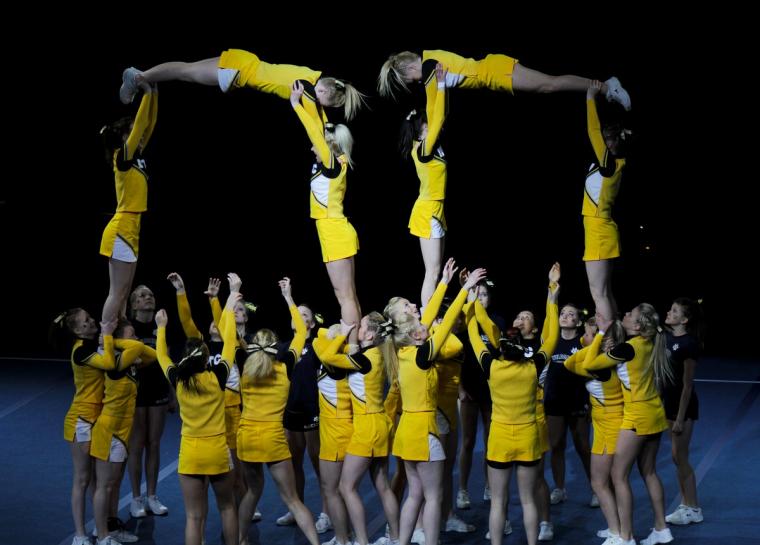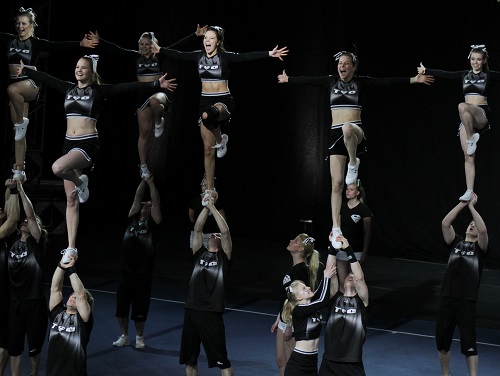
Gimme a… never mind; it takes too long to cheer-spell “ANTITRUST.” But Varsity, the organization that runs major cheer competitions and camps nationwide, just agreed to a settlement in a case in which it stood accused of abusing its industry dominance and causing private gyms and spectators to pay artificially inflated prices.
Call it Cheergate or call it a victory for smaller event operators. Or just call it one step in the ongoing evolution of the sport.
According to Sporting Goods Business Media, Varsity, the apparel company and producer of cheerleading events, agreed to pay $43.5 million to settle a federal lawsuit that it has been fighting since 2020. (It’s still not admitting wrongdoing or liability, though, and is calling the outcome "positive for everyone involved.")
SGB Media states that the settlement deal resolves one of three federal antitrust lawsuits Varsity has defended over the last three years. (More on the others later.) The plaintiffs in this case, which came to be known as Fusion Elite All Stars, et al. v. Varsity Brands, LLC, et al, were “direct purchasers” (gyms paying to register at Varsity events and spectators paying to see them) over the last seven years. Reuters reports that the plaintiffs alleged Varsity used “exclusionary contracts and anticompetitive loyalty programs.”
Varsity originally attempted to have the lawsuit dismissed; in a court filing made in 2020, Varsity's attorneys characterized the plaintiffs as “three disgruntled gyms that do not like the rules and structure Varsity has created" and said that the claims “fundamentally misconstrued” U.S. antitrust laws. But in 2021, U.S. District Judge Sheryl Lipman of the Memphis, Tennessee federal court declined to dismiss the lawsuit and allowed it to go forward.
History of the Lawsuit
SGB Media explains that the lawsuit was filed in 2020 by California cheerleading gym Fusion All Stars, "which alleged that Varsity had violated the Sherman Antitrust Act by acquiring cheerleading events and shutting down its rivals in the all-star cheer business to gain market dominance and then using that market dominance to produce events and sell specialized apparel “to erect a moat that protects its lucrative businesses from free and fair competition. According to the complaint, Varsity used its market power to impose predatory contracts on all-star gyms, requiring near-exclusive patronage of Varsity’s products and services."
Sportico notes, “The other defendant in the case was the U.S. All Star Federation (USASF), the Varsity-backed cheerleading governing authority, which the plaintiffs accused of being central to Varsity achieving what it termed a monopoly power over the cheer market.”
The suit also alleged "that Varsity used its control over the sport’s governing bodies, including USASF, to impose rules that disadvantaged its rivals, relegating potential event-producing competitors to “B-League” status. The suit claims that Varsity’s monopolistic measures resulted in control over approximately 90 percent of the all-star competition market and 80 percent of the all-star apparel market."
According to the complaint, Varsity used what Fusion, et al termed a “predatory scheme to impose substantially inflated prices on all-star gyms for its all-star competitions and specialized all-star apparel and also reduced the number of competitors and events, undermining freedom of choice in the industry."
 In the settlement papers obtained by Reuters, lawyers for direct purchase plaintiffs said the proposed deal, subject to a court’s approval, was the “result of lengthy and hard-fought litigation over two-and-a-half years and intense negotiations.”
In the settlement papers obtained by Reuters, lawyers for direct purchase plaintiffs said the proposed deal, subject to a court’s approval, was the “result of lengthy and hard-fought litigation over two-and-a-half years and intense negotiations.”
Additionally, the plaintiff’s lawyers said the settlement provides “substantial monetary recovery” and other forward-looking relief that bars some of the conduct the plaintiffs challenged as anticompetitive.
Varsity said, for its part, “the company remains confident it has acted appropriately and in the best interest of our sport.”
A second case is still active: Jones et al. v. Varsity Brands. That lawsuit represents a prospective class of cheerleading parents who have accused Varsity of driving up consumer costs through their allegedly illegal anticompetitive behavior.
What is Likely to Change?
Without a crystal ball, it is difficult to say exactly what will happen or when; in fact, the landscape may take years to change. Some event owners have booked sites and dates for competitions years into the future, so it is unlikely that immediate change will be felt – at least not by athletes. Sportico summed up the building blocks as follows:
“In addition to the settlement’s financial terms, Varsity and the USASF agreed to a list of conditions meant to curb what critics have said is Varsity’s improper influence over the cheer organization it founded in 2003. According to the deal the parties struck, current Varsity board members will no longer be able to simultaneously serve on the board for USASF, and Varsity cannot pay for the salaries or benefits of USASF employees and executives. Moreover, no single cheerleading event producer will be able to occupy more than a third of the voting seats on USASF’s board nor comprise more than 40 percent of USASF’s sanctioning committee.”
Reporters at Sportico also state that the lawyers for the plaintiff characterized the settlement as fair and noted its stipulations regarding the USASF governance have “the potential to facilitate vigorous competition in the all-star cheer events market.”
Something interesting is that the case could serve as a precedent; in fact, the youth sports industry is likely to keep a closer eye on marketplace behavior, given the terms of the settlement.
Dr. Janet Netz, an economist with ApplEcon, sees the potential for change on the horizon:
"I think that there is a good chance that this settlement will lead to an increase in competition in competitive cheer," she told SDM. She breaks down the ways this could happen:
"The settlement includes two provisions that could change the competitive landscape: limits on entanglements between Varsity and the USASF (and limiting the influence of any single industry participant on USASF) and a reduction in the number of Varsity events attended to qualify for the highest tier of the rebate program. The former gives other event producers and industry participants the ability to get the USASF to pass rules that do not favor Varsity. Such changes could help non-Varsity event producers to become significant rivals. The latter substantially reduced the degree to which Varsity’s rebate program foreclosed gyms from attending events sponsored by other event producers. Under the old rules, if a gym chose to attend a non-Varsity event, it could lose a substantial amount of Varsity rebate dollars, making it more economic to attend a Varsity event. This change will make non-Varsity event producers more attractive, and such producers can get established."
"Both provisions," she adds, "sunset in 2028, but by then enough competition may have developed to prevent Varsity (or others) from dominating the market."
So with that in mind, is there a time frame by which cheer can expect a sea change? Netz says it is difficult to quantify since "there are many entities that are trying to get a foothold and events can be put together fairly quickly. Seasons are generally planned out a year in advance so I would expect it to take about two to three years to see a significant change."
Varsity Still Has One in the W Column
Varsity didn’t come out the loser in every case, however. The same week that news of the settlement broke, it was announced that a federal judge had dismissed a three-year-old lawsuit filed against Varsity (owned by the Bain Capital organization) that had been brought by a group of smaller cheer competitors.
(Quick note: If your eyes are glazing over from trying to follow the legalities by now, take a break and read this synopsis from The Cheer Buzz.)
Chief U.S. District Judge Sheryl Lipman’s ruling did not address the merits of the litigation, but rather what she described as the plaintiff’s “reckless disregard” for procedural rules in the “tortured history of discovery in this antitrust case.”
Among multiple violations Judge Lipman cited was the plaintiffs’ production of nearly 200,000 documents months after the fact discovery deadline had passed, behavior she said, “evinces a nonchalant attitude to the Court’s deadlines.”
Sounds like, in cheer-spell, the plaintiff failed to, ahem, “B-E! A-G-G-R-E-S-S-I-V-E!”

